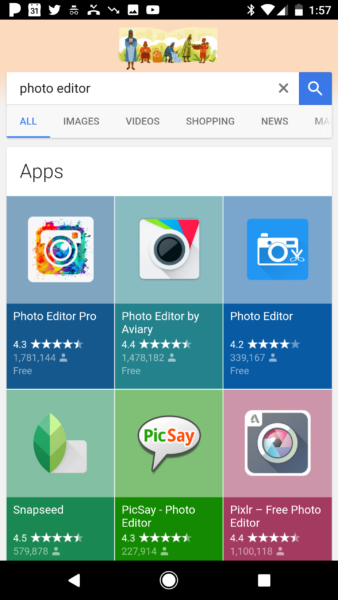Simple tips to get your app indexed, ranked & installed
Got an app you'd like to promote? Columnist John Lincoln provides some basic tips for helping your app to appear in Google's "app pack" search results.

Do you have an app that you’d like to rank in mobile search engine results? If so, you’re going to need to make room in your SEO strategy for app optimization.
For apps, there are distinct ranking factors. Although they are similar to ranking factors for a standard web page, there are differences that you need to know about.
Here’s how you can optimize your app to get the best possible rank.
Yes, you need to optimize
According to a recent Google report, 27 percent of users find apps through a search engine. That’s up from 2 percent to 3 percent in 2014.
That trend will likely continue. Why? Because Google is emphasizing app downloads from search results while brushing aside Google Play as a search engine. Google has also become better at ranking apps, a trend we can expect to continue.
Even though 40 percent of people still find apps by searching in an app store as of now, it’s still a great idea to plan for the future and optimize your app so people can find it with a search engine.
Get in the app pack
Although the word “app” can include web-based applications offered as a service, most people think of apps as mobile applications that people download and install. Google understands that.
As a result, Google now includes an “app pack” at the top of the mobile search results. You can see it if you open up the browser on your mobile device and search for something like “photo editor.”
The app pack will include between one and six apps. If more than six apps match the search query, Google will display an arrow at the bottom of the pack so that users can view the rest of the results.
Google also offers a decent amount of info about each app in the pack. In addition to displaying the app image and title, the app pack also shows the app rating and price. Users who click on the app square are taken to the store where they can download and install the app.
Another nice feature: apps displayed in the app pack are specific to the underlying platform. In other words, Android users will never see an app that’s only available on iOS, even if that app matches the search term.
There’s a downside, though
At this point, you might think it would be great if your app showed up in the app pack. While there’s an obvious benefit to appearing at the top of the mobile search results, there’s also a downside.
The bad news is that for every app that appears in the app pack, one web ranking is pushed off the page.
For example, if your website is ranking at the very top of the organic mobile results for a keyword (or your brand name) and you optimize your app to appear in the app pack for the same keyword, this could push your organic listing down the page — possibly below the fold. That could have an impact on your search marketing efforts, especially if there was no app pack appearing for that search query before your app optimization efforts.
So, if you effectively optimize your app, there are instances where you could find yourself robbing Peter to pay Paul. However, if there’s already an app pack appearing for your target queries, it’s worth pursuing visibility within this space since this is already impacting organic positioning.
Use the right keywords
The first thing to do to optimize your app for search engines is to take a page out of the SEO 101 playbook: gather the right keywords.
In my experience with keyword research, I’ve seen people who search for an app usually do so with a noun. They might search for something like “photo editor” or “travel planner.”
So start your optimization efforts by thinking more about what your app is than what it does.
“Edits photos” is what your app does. People won’t search for that.
“Photo editor” is what your app is. People will search for that.
Optimize the title and description
You can think of the title of your app much like the title tag of a web page. It’s very important for SEO purposes.
Also, Google evaluates app descriptions as text on a web page.
That’s why you should optimize the app title and description just as you would optimize a web page title and its content. Use the keywords that you gathered from the first step and sprinkle them appropriately throughout the description. Put the most important keyword in the title.
Keep in mind, though, that you’ll also want a branded title. For example, “SnapHelper — A Photo Editor” includes both the name of the app and an explanation of what it is.
Of course, you’ll face limitations on how many characters you can include in the app title (50 characters for app store, 30 for Google Play). In that case, you’ll have to get creative about what you’ll include and how you’ll include it.
You need reviews
Here’s where app SEO parts company from more traditional SEO efforts: you need reviews.
For starters, your app might rank based on keywords included in reviews on the app page. It’s often the case that keywords toward the top of the page are given more weight than keywords farther down.
The star rating will also affect how your app ranks. You might notice that some apps with better ratings outrank other apps that have better keyword optimization. That’s because Google pays attention to ratings.
Undoubtedly, the star rating will also affect the click-through rate. That will likely impact its rank as well.
Use app-specific keywords
You’re ranking for an app. Why not use the word “app” in your title and/or description?
Keep in mind that people who search for an app in the app store probably won’t use “app” in their search query. However, people who search for an app with a search engine are much more likely to use it.
Optimize for the word “app,” and you’ll likely stay ahead of your competition.
Also, use the name of the operating system in the app title and description. People using search engines to find an app will likely include their platform in the search query.
Wrapping it up
Optimizing an app for the search engines is different from optimizing a web page. However, with the right know-how and a little bit of effort, you can boost your app to the top of the search results.
Contributing authors are invited to create content for Search Engine Land and are chosen for their expertise and contribution to the search community. Our contributors work under the oversight of the editorial staff and contributions are checked for quality and relevance to our readers. The opinions they express are their own.
Related stories
New on Search Engine Land

